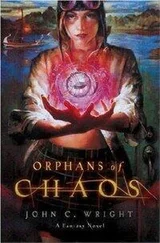The index on this self-consideration routine was not complex enough to analyze why Phaethon was more afraid than he ought to be.
According to Phaethon's belief (reported the index) the last virus-entity attack had failed. It had been thwarted by his armor, which had snapped shut and severed the connection. Why was he so afraid of a type of attack he knew how to defeat?
According to the index, it would have been more natural for Phaethon, at this point, to be imagining schemes to be able to log on to the mentality, and yet be ready to thwart a second attack, perhaps with witnesses logged on and watching his thoughts for any sign of the enemy.
The index pointed out that this was exactly what Phaethon had done at Victoria Lake, when the three mannequins had been seeking him. Why was he brave enough to do it physically, but not mentally?
An attack in front of witnesses would prove to the Golden Oecumene that Phaethon had not been self-deluded. If no attack came, an uninterrupted mentality session would allow Phaethon to display to the world noetic deep-structure recordings proving that he was not self-deluded. In either case, the Hortators, by their own verdict, would then be forced to restore Phaethon to his former honors and community. Why was he so reluctant? The index concluded that his reluctance and his fear were unusual.
According to the index, there were false-to-facts associations in Phaethon's mind related to his beliefs about the last virus-entity attack and its failure. His actions did not correlate with his apparent thoughts related to the strength and fear-someness of this virus. For example: if Phaethon where so unwilling to log on to the mentality to suffer a noetic reading, then why had he, immediately after the attack, opened all his brain channels to receive his missing memories from the Rhad-amanth house-mind, whom he, at that time, thought was infected by the virus?
Phaethon watched this analytical routine with a growing sense of impatience. The index of this self-consideration routine, after all, had been programmed and created by the Eleemosynary Composition. Naturally it would tend to dismiss perfectly rational and legitimate fears as hysteria. The whole point of the program was to convince people that their individual lives were hysterical, unpleasant, or unnaturally fearful, in order to convince them to join with a mass-mind for comfort and protection. Also, the index probably dismissed his fears as paranoia. After all, this index was not meant to be used by a man who really and actually was being hunted by a powerful, evil conspiracy. It probably dismissed his desire to save the entire Oecumene from a horrible outside menace as delusions of grandeur, but only because it had never taken readings from a man in a position to fight such a foe and save civilization.
Is it paranoia when they are really after you? Is it megalomania if you are actually poised to do great things?
The index tagged his present thoughts as a rationalization, and recommended psychological therapy. Phaethon snorted and shut the self-consideration system off.
He was too tired to think about it now. He used the slate to open his anonymous account in the mentality again, found some free dreams, which were being distributed as part of the Millennial festival. Most selections on the menu were uninspiring, but, to his surprise, he found one to his taste, a heroic piece. It took several minutes to download that one into the slate, and then restructure it from the slate to his thoughtspace. He had to organize its running-instructions one line at a time, now that he had erased his secretary.
But eventually, he had his dream and went to sleep.
He dreamed a dream he had seen before. The world was beneath a great glass dome, and he rode a defiant ship, lines and shrouds dripping with ice, up to the utmost apex of that dome, and drew back an ax to shatter it, while gathered nations far below cried out in agonies of fear...
It was time to set his plans in motion.
Awake, alert, rested, Phaethon began with a few hours of research on the public law-channels. This could be done anonymously, and without any interference from the Hortators, since the Curia, and its library of case law, could not be closed to any citizen.
Without the Rhadamanthus lawmind to help him, Phaethon was baffled by the large number of cases, the complexity of the law, and the arbitrary nature of the findings. But he was able to download several volumes of case histories into an open section of the house-mind he was in (shutting off the sewerage and kitchen recycler to find the space to do it), and eventually the house-mind independently confirmed Phaethon's tentative opinions in the matter.
Next he touched the slate, opened a communication channel, and brought up the public emergency menu. Icons representing Fire, Mind-crash, Space debris, Ecological flux, Storm, Snow, Panic, and Injury opened up like red and blue-white flowers in the slate's surface. And then the gold-and-blue emblem of the constabulary presented itself.
He paused.
What he intended suddenly seemed so mean and so petty. Phaethon did not want to appear either ruthless or ignoble when his accomplishments were contemplated by posterity.
He smiled to think how alien such a scruple or such a desire would be to his many opponents, people who had wronged him. They would think it improbable, or perhaps vain, to think a man would want history to think well of him.
"Well," he said eventually, "the worst type of ignobility may be to let others take advantage of your noble nature. I cannot help but feel sorry for those wretched Afloats, though. This will come as quite a shock."
He touched the symbol and spoke aloud: "Allow me to speak with Constable Pursuivant. I wish to testify against one Vulpine First Ironjoy Hullsmith, base neuroform with non-standard invariant extensions, Uncomposed and Unschooled. And, no, I will not submit myself to a noetic reading to make my complaint. According to the law, a verbal complaint is sufficient to allow you to act..."
A young woman appeared in the slate, accompanied by the squawk of music. She wore a semi-crystalline, semi-liquid body imbued with constabular blue and gold. Her body-shape, language, school, and emblems were of a type which Phaethon, without the Middle-Dreaming to help him, could not interpret.
"I'm sorry," Phaethon said, "I cannot understand your language at that speed."
Parts of her crown glowed, while other parts went dim; she was evidently switching minds, or employing an interpreter. "This part of me and us are most happy to accept any complaint against Vulpine Ironjoy howsoever formatted. The constables have been trying to get the Curia to shut down his operation for decades. But we and I cannot help you achieve your other expressed desire. We and I cannot bring you in communication with the one you call Constable Pursuivant."
"Why not? Is he hurt?"
"Hurt? How could any citizen of the Golden Oecumene be hurt? No. You cannot speak to a constable named Pursuivant because there is no such person."
It was amazing how quickly things changed. By the time Phaethon in his armor emerged in an explosion of steam from the surface of the sea and arced down to the deck of Ironjoy's thought-shop, the Afloats were already jacked out of the mind-system, fired from their jobs, had begun to riot, and now lay stunned and numbed under the diligent immobilizer prongs of darting constable-wasps.
Ironjoy was standing at the square bow of the barge, arms folded and arms akimbo, staring down at the water in a brooding posture. The Curia had already conducted his trial over the mentality, at a high-speed time rate.
The constables had been allowed to serve a warrant to investigate Phaethon's allegations. Evidence was taken from Ironjoy's memory before he was able to induce autoamnesia, not just of one petty crime, but of so many, that Phaethon's testimony had not been required at the trial.
Читать дальше











